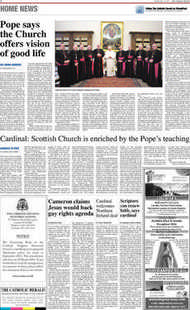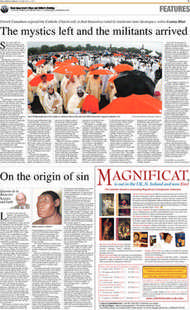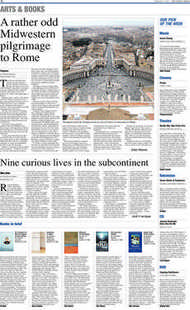Page 6, 12th February 2010
Page 6

Report an error
Noticed an error on this page?If you've noticed an error in this article please click here to report it.
Tags
Share
Related articles
Nuclear Threat Revealed By Gulf Crisis, Nuncio Warns
Vatican Calls For Nuclear-free Zone In Middle East
Military Bishop Cautions Bush
`the Biggest Moral Issue In The World'
Abolish Nuclear Weapons, Say Japanese Bishops
Rid world of nuclear arms, says archbishop
BY GEORGE MATYSEK JR
AN AMERICAN archbishop has urged world leaders gathered in Paris to build a future “free of nuclear threat”.
Archbishop Edwin O’Brien of Baltimore said the path towards eliminating nuclear weapons would be “long and treacherous”, but humanity “must walk this path with both care and courage in order to build a future free of the nuclear threat”.
Speaking last week to 200 international leaders at the Global Zero summit Archbishop O’Brien cited the Second Vatican Council’s condemnation of “total war” and the Council Fathers’ scepticism of “deterrence” as a way to lasting peace.
The archbishop said: “Every nuclear weapons system and every nuclear weapons policy should be udged by the ultimate goal of protecting human life and dignity, and the related goal of ridding the world of these weapons in mutually verifiable ways.” Archbishop O’Brien, who served for a decade as head of the US Archdiocese for the Military Services before being appointed to the Baltimore Archdiocese in 2007, said the goals of just war teachings were to “reduce recourse to force and to restrain the damage done by war”.
He said that just war teachings assert that the use of force must be discriminate, with civilians and civilian facilities preserved from direct, intentional attack. The use of force must be proportionate, he said, with the overall destruction not outweighing the good to be achieved. It also must have a probability of success, he said.
“The real risks inherent in nuclear war make the probability of success elusive,” Archbishop O’Brien said. He pointed out that nuclear war is rejected in Church teaching because it “cannot ensure non-combatant immunity”.
He added that the likely destruction and lingering radiation brought on by nuclear war would violate the just war principle of proportionality.
“Even the limited use of so-called mini-nukes would likely lower the barrier to future uses and could lead to indiscriminate and dispro portionate harm,” Archbishop O’Brien said. “And the continuing possession of nuclear weapons undermines non-proliferation efforts and contributes to the danger of loose nuclear materials falling into the hands of terrorists.” The archbishop called on the US to focus on the “next steps” in eliminating nuclear weapons.
“This requires the successful negotiation and ratification of a START [Strategic Arms Reduction Treaty] follow-on treaty with the Russian Federation, the ratification of the Comprehen sive Test Ban Treaty, and the adoption of a nuclear posture that rejects the first use of nuclear weapons or their use against non-nuclear threats,” he said.
Archbishop O’Brien said the Catholic Church’s opposition to nuclear weapons was not new.
“Our Church works consistently to defend the life and dignity of all: the unborn, the poor, the immigrant, and persons in every age and condition of life,” he explained.
“This moral commitment to protecting human life led to the adoption and development of the Church’s just war teaching.” He pointed out that as a permanent observer to the United Nations, the Holy See has ratified the Nuclear NonProliferation Treaty and actively participated in the Treaty’s review conferences in the last four decades.
The archbishop also quoted Pope Benedict XVI, who said in his 2006 World Day of Peace message that in a nuclear war “there would be no victors, only victims”.
Other speakers at the Global Zero summit last week included former US Secretary of State George Schultz, Queen Noor of Jordan and the American actor Michael Douglas.
A message was read from UN Secretary-General BanKi Moon.
The summit was timed to lead up to the Global Nuclear Security Summit in April, convened at the request of President Barack Obama, and a conference to review the Nuclear Non-Proliferation Treaty in May.
The summit called for the worldwide elimination of nuclear weapons by 2030.
blog comments powered by Disqus





















